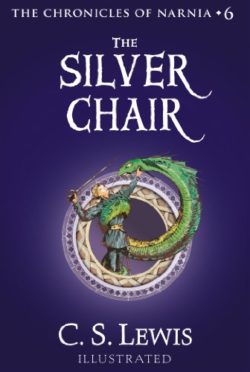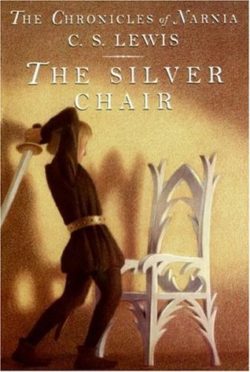 by C.S. Lewis
by C.S. Lewis
Unconditional Recommendation: Jill Pole and Eustace Scrubb go to Narnia and on Aslan’s orders, embark on a journey to find the lost Prince Rilian of Narnia.
Genre: Fantasy, Christian Allegory
To be frank, this is my least favorite book of the Chronicles of Narnia series. This is because it’s darker than the others and a good portion of the story takes place underground. It also has, more than those in previous books, flawed characters who legitimately struggle. That being said, it’s still a good book, a good adventure, and shines with some particularly good scenes.
You’ll want to have read Prince Caspian and The Voyage of the Dawn Treader to have background on Eustace and King Caspian. The background will lend more meaning to the story.
Narnia . . . where owls speak, where evil weaves a spell . . . where sorcery enslaves the land. Narnia is in peril, and only Eustace and Jill can help. Along with Puddleglum, a gloomy but valiant Marsh-wiggle, they are sent by the mighty lion, Aslan, to find Prince Rilian, heir to the throne. Their quest leads them past hungry people-eating giants and deep into the dark underground. But the true test for this noble band of friends comes when they face an evil Witch and her deadly enchantments.
I would have to say that the allegorical theme of this book is: God can use us just as we are—with all our foibles, flaws, and sins. God uses imperfect people to work out His purpose. Eustace and Jill fight, get distracted, and mess up at every turn but the mission Aslan sent them on is still accomplished.
My favorite parts of any Narnia book are those that include Aslan. I absolutely love him as a Christ figure. In this book, He gives Jill words to remember for the task ahead, words to keep on her mind to guide them. This, of course, could be taken as an analogy of the Bible and how it’s the powerful word of God given to us to instruct and comfort us as we live out our lives.
Speaking of the power of the word of God, I really enjoyed how Aslan’s instructions made a confusing situation clear to Jill, Eustace and Puddleglum. His words bring clarity and reveal truth when the enchantments of the witch attempt to distort reality. How very true of our own lives as Christians living in a lost world. We can get confused and reality can be distorted by all the philosophies, perspectives, and words of this world, but it’s the word of God that makes everything clear again.
If you’ve made it to this book in the Chronicles of Narnia you should know how excellent C.S. Lewis’ storytelling is. His descriptive writing can be blunt and humorous and you never lose the sense you’re being told a story. I think that’s what makes his writing so enjoyable. It feels personable. His books were made to be read aloud.
Right away the reader is introduced to Jill Pole, a new character who goes to school with Eustace and then accompanies him to Narnia. The Pevensie children, Peter, Susan, Edmund, and Lucy, do not appear in this book; however, we do see King Caspian as an old man at the end of his life. Eustace is a changed “chap” after The Voyage of the Dawn Treader and throughout the book some of his old self appears now and again but otherwise it’s like he’s a new character. I like that he’s different but I also like that he’s still a work in progress. It’s realistic.
A notable Narnian character is Puddleglum the Marsh-wiggle. At first his negativity does not endear you to him but after a while you understand the humor of this doom-and-gloom character and think C.S. Lewis all the cleverer for it.
The best part of this book is the end. I love the ending! After old King Caspian dies, we see him alive again as a young man in Aslan’s country and I love that death is portrayed as a transition to another life rather than an end. It’s a hopeful concept and one true to reality for the believer in Jesus Christ. The ending with Caspian, Jill, and Eustace is satisfying and triumphant. Enjoy!
The Voyage of the Dawn Treader (#5)


